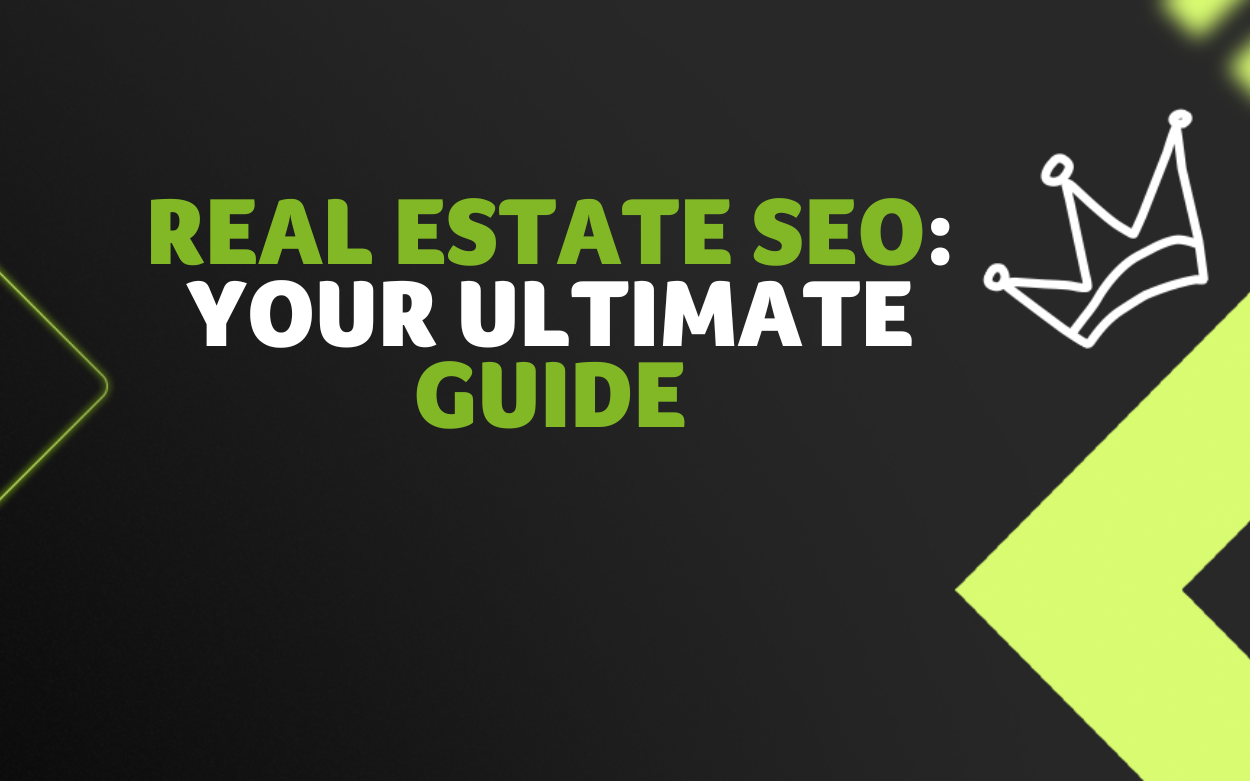
We’ve all heard the stories—real estate agents pouring thousands into search engine optimization (SEO), only to see little to no return.
It can be a frustrating and expensive experience, but here’s the truth: companies invest millions each year in SEO because it works.
Why? Because 92% of homebuyers use the Internet as their main source of information during their home search.
Mastering SEO allows you to be the first agent potential clients find online when they’re ready to buy or sell.
In this guide, we cover everything you need to know before diving into SEO. Understanding the basics is critical, whether you’re considering hiring real estate SEO services or taking the reins yourself.
A real estate SEO strategy involves more than slotting in a few keywords—it’s about showing up in the right place at the right time and dominating your local market while leaving your competitors in the dust.
What Is SEO for Realtors?
SEO, or search engine optimization, is the process of making your real estate website more visible to potential clients who are searching online for properties.
It’s about ensuring that your website appears in the search results when someone types in “homes for sale in [your city]” or similar queries.
By optimizing your website’s content, structure, and technical elements, you increase its relevance to search engines like Google.
The higher you rank in search results, the more likely people are to click on your link, leading to increased traffic to your real estate listings and more potential leads.
Studies show that 68% of all clicks go to the top three results on the first page. This highlights the importance of ranking well; results on the second page and beyond receive significantly less traffic.
Why Is SEO for Realtors Important?
Why should real estate agents invest time and resources into SEO? The answer is simple—the ROI is impressive.
Let’s talk numbers: the search term “Miami condos for sale” gets around 1,600 monthly searches.
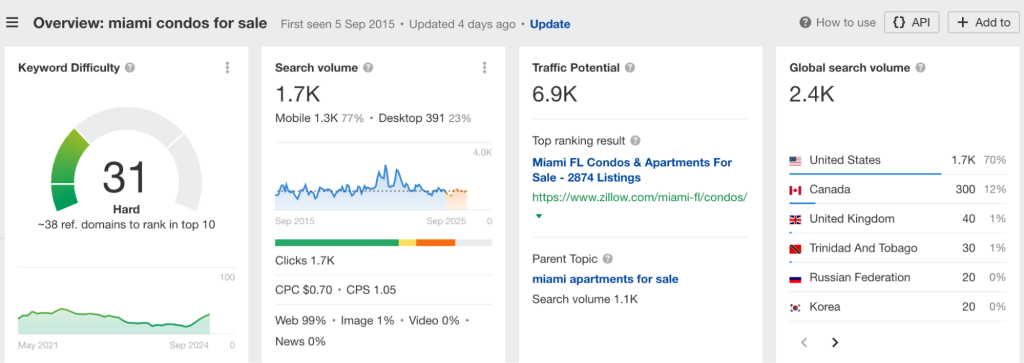
Source: Ahrefs
Now, picture your website sitting pretty at the top of those results. Getting just 30% of those clicks translates to 480 site visits–every month!
We’re talking Miami real estate, so the median price of a three-bed condo is $2.7 million. Even if a conservative 2% of your visitors convert into clients, that’s 9-10 new clients each month.
With a 3% commission, you could earn around $800,000 monthly—mic drop.
The benefits of real estate SEO
Having a robust SEO strategy isn’t just about the immediate payoff; it’s about building a sustainable, thriving real estate business:
✅ Brand awareness: When you consistently appear at the top of search engine result pages, you’re not just getting clicks but becoming the trusted name in your local real estate industry.
✅ Say goodbye to ad spend: SEO is like a gift that keeps giving. Once you’ve earned those top spots, you can ease up on Google Ads and let your organic traffic do the heavy lifting.
✅ Long-lasting impact: Paid ads disappear the moment you stop paying. SEO is like planting a tree—it takes time and effort to grow, but once it’s established, it keeps bearing fruit for years to come.
Real Estate SEO Key Elements
Content
Content is the cornerstone of SEO—it’s what draws visitors in and keeps them engaged.
Craft blog posts about the hottest neighborhoods in your area, provide insider tips for first-time buyers, or showcase virtual tours of your listings.
Use keyword tools to incorporate long-tail keywords into your content, like “homes for sale in [your city]” or “top real estate agent in [your area],” to let Google know you’re the expert they’re looking for.
On-page SEO
On-page SEO refers to all the optimization efforts that you make directly on your website to improve its search engine rankings.
We’re talking about crafting compelling title tags and meta descriptions, using header tags to organize your content, and ensuring your web pages load quickly. It’s all about creating a user-friendly experience that Google loves.
Technical SEO
While content and on-page SEO are the visible aspects of SEO, technical SEO works behind the scenes to ensure your website’s foundation is solid.
Technical SEO includes elements like sitemaps, robots.txt files, and ensuring your web page is mobile-friendly. It’s not the sexiest part of SEO, but it is crucial for success.
Off-page SEO
In real estate, reputation is everything. Off-page SEO is about building your online credibility and authority.
The more high-quality websites link to yours, the more Google sees you as a trustworthy source.
It involves guest blogging, social media marketing, and building relationships with other real estate websites in your niche.
👇🏼 Confused? Don’t worry; we’ll break this all down below.
What is EEAT?
How does Google decide which websites deserve those coveted top spots? It’s not magic, but it’s close. They use a secret recipe called E-E-A-T:
- Experience: Does your content demonstrate real-world expertise or knowledge? Are you the go-to expert in your field? Google loves content that’s backed by firsthand experience.
- Expertise: Are you qualified to discuss this topic? Do you have the credentials or track record to prove it? Showcasing your expertise builds trust with Google and your audience.
- Authoritativeness: Is your website a trusted source of information? Do other reputable websites link to you? Building authority takes time, but it’s a key ingredient in Google’s recipe for success.
- Trustworthiness: Is your website safe and secure? Do you have clear contact information and privacy policies? Google wants to ensure users have a positive and trustworthy experience.
So, what does EEAT mean for your real estate SEO? In a nutshell, it means Google is prioritizing content that is:
🏆 High-quality and informative
🏆 Created by experts
🏆 Backed by a reputable website
How to Get Started with Real Estate SEO
Sign up for local citations
Most realtors don’t aim for global domination; they focus on serving specific areas or neighborhoods.
To ensure that potential buyers find you easily, you should establish a presence on industry-specific directories like Homes.com and Trulia. These directories, also known as local citations, function as online references for your business, contributing to your overall online presence.
Local citations not only simplify the process of people finding your real estate business, but they also enhance your SEO efforts.
These citations serve as signals to search engines, confirming your business’s legitimacy, location, and relevance within your community.
Google Business
One of the most important citations to prioritize is Google Business. It puts you on the map—literally!
A strong Google Business profile boosts your local SEO, which means you’ll appear in local searches. You may also snag a spot in the coveted “Local Pack” at the top of results.
What is a local pack?
A local pack is the prime spot of digital real estate that appears at the top of organic search results when someone is looking for a local business.
For example, if a potential client in Los Angeles types in “real estate agent in Los Angeles,” the Google Local Pack appears, showcasing a select group of agents, their reviews, and their office locations on the map:
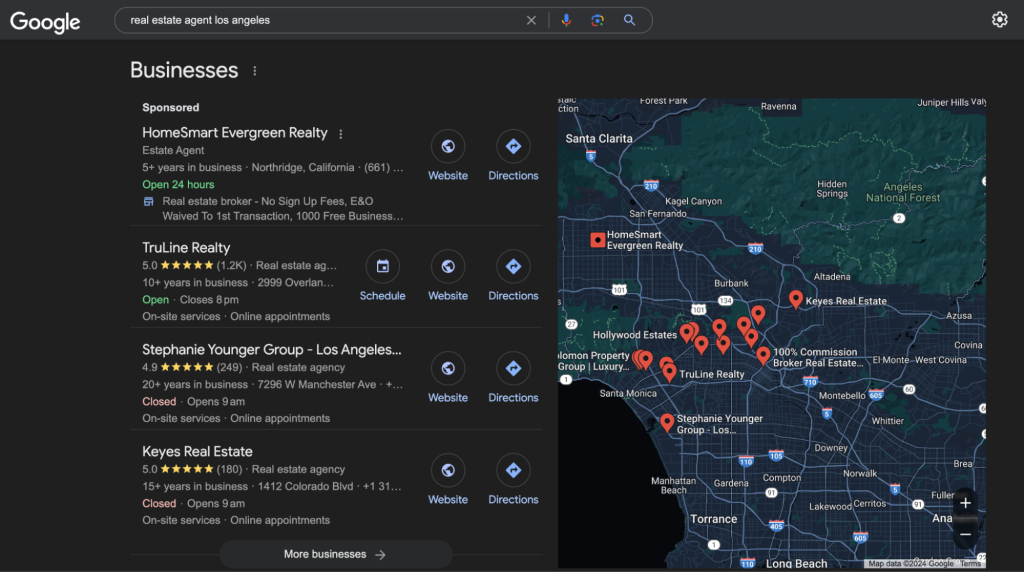
Source: Google
Securing a spot in this coveted section isn’t luck; it’s about optimizing your Google Business listing and ensuring consistent citations across various local directories. Below, we show you how to set it up.
How to set up Google Business for your real estate agency
1️⃣ Create or sign in to your Google account
2️⃣ Go to Google Business
3️⃣ Add or claim your business: If your real estate agency is already listed, you can claim it and verify ownership. If it’s not listed, click on the “Add your business” or “Manage now” button to start the process.
4️⃣ Provide accurate and complete information about your business, including:
- Business name
- Address
- Phone number
- Website URL
- Business category (e.g., “Real Estate Agency,” “Real Estate Agent,” “Property Management Company”)
- Service areas (the neighborhoods or cities you serve)
- Business hours
5️⃣ Verify your business: Google will verify your business ownership by sending a postcard with a verification code to your address. Once you receive it, enter the code on your Google My Business dashboard to complete the process.
| 💡Pro-tip: There are other verification methods. Check your Google Business dashboard for the options available to your real estate business. |
6️⃣ Optimize your listing: Once verified, go the extra mile to make your profile stand out. Add as much relevant detail as possible, such as:
- A business description that highlights your specialties and unique selling points.
- High-quality photos of your office team.
- Your most attractive listings.
- Engaging posts about market trends, local events, or new properties on the market.
- Client reviews, building trust and demonstrating your expertise.
Get on social media
While local citations establish your presence in specific areas, social media expands your reach and connects you with a broader audience. Social media platforms are a way to broadcast your listings, engage with your target audience, and foster a community around your brand.
Think of social media as your 24/7 open house. It’s where you can:
- Showcase your listings: Give your properties the spotlight they deserve with eye-catching photos, virtual tours, and engaging descriptions.
- Connect with potential clients: Answer questions, offer insights, and build relationships with home buyers who are actively interested in buying or selling.
- Establish yourself as the local expert: Share market updates, neighborhood highlights, and valuable tips to position yourself as the go-to resource in your area.
Social media is not just about sharing pretty pictures—it’s a serious lead-generation machine.
38% of new real estate clients in 2022 found their agent through social platforms—you don’t want to miss out on that slice of the pie!
And here’s the bonus: a social media presence sends positive signals to search engines. It shows that you’re active, engaged, and relevant—these factors can boost your overall SEO efforts.
Plus, every time someone clicks on a link in your social media post that takes them to your website, that’s regarded as a boost in organic traffic.
Create quality content
Forget those spammy, keyword-stuffed articles from the dark ages of SEO. Today, it’s all about creating quality content that pleases Google and wows your audience.
But what does “high-quality” even mean in the real estate world? Let’s break it down:
✔️ Relevant
Your content needs to speak directly to the needs and interests of your target audience. This could mean writing about the latest market insights, compiling neighborhood guides, and providing actionable tips for buyers and sellers.
✔️ Professional
Typos and grammar errors? Not on your watch. Well-written, polished content shows you’re not just an estate agent but someone people can trust with big decisions.
✔️ Original
Google hates duplicate content. Your articles and posts should be fresh and original, and offer a unique perspective on your local market. Don’t just regurgitate what everyone else is saying.
✔️ Trustworthy
Back up your claims with data, cite reputable sources, and remember to include client testimonials. It’s all about building credibility and showing Google (and your audience) that you’re the real deal.
✔️ Keyword-rich
Think of keywords as the breadcrumbs that lead Google to your content. Use them strategically and naturally throughout your text so Google knows exactly what you’re talking about.
For example, in an article about “Miami condos for sale,” ensure local keywords like “Miami real estate” and “Miami Beach properties” are naturally integrated into the content. Avoid keyword stuffing.
| 💡Key point: What is “keyword stuffing”?
Keyword stuffing is a frowned-upon SEO tactic where a web page or piece of content is overloaded with keywords to manipulate its ranking in search engine results. This can involve:
|
✔️ Detailed
Don’t just skim the surface—dive deep! Answer your audience’s questions thoroughly and provide valuable information they can’t find anywhere else.
✔️ Multimedia-rich
To make your text more engaging, incorporate images, videos, and infographics. Think virtual tours, property photos, and market trend charts.
✔️ Shareable
Create content that people can’t resist sharing with their friends and followers.
The more your content gets shared, the more comprehensive your reach will be, and the happier Google will be.
ℹ️ Here’s an example of what we mean by great content: This Miami real estate guide checks all the boxes for quality real estate SEO: it’s relevant, professional, trustworthy, keyword-rich, and visually appealing, all while being optimized to attract and engage a local audience.
If you are not sure how to do this yourself, don’t worry. We’ve got you covered below!
How to create your own content
1️⃣ Brainstorm content ideas
Before you start writing, take a moment to brainstorm content ideas that will resonate with your target audience.
Here are a few places to dig for inspiration:
- Client conversations: What questions do your clients constantly ask? What challenges do they face? Tap into those real-life conversations to uncover content goldmines.
- Online communities: Lurk in forums, Facebook groups, and social media pages where your ideal clients hang out. What are they talking about? What are their concerns?
- Competitor blogs: Scope out the competition and see what they’re writing about. Can you offer a fresh perspective on a popular topic? Or maybe there’s a gap in their content that you can fill.
- Keyword research tools (like Ahrefs): Use SEO tools to see what people are actually searching for. More on that below!
2️⃣ Perform keyword research
Keywords are the words and phrases people use to search for things online. By using the right keywords throughout your content, you’re essentially telling Google, “Hey, this is what my page is about!”.
Here’s how to use Ahrefs to find keywords:
1. Go to Keywords Explorer: Type in a keyword related to your topic. Let’s say you want to write a guide featuring the keyword “Miami real estate.”:
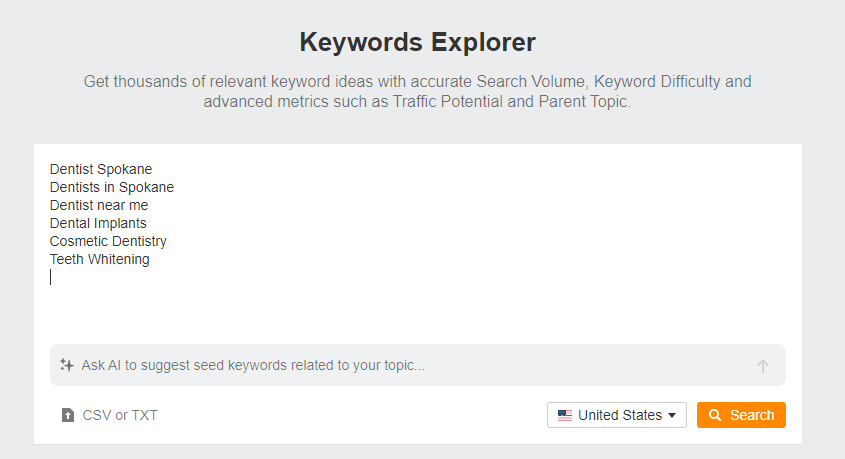
Source: Ahrefs
2. Analyze keyword metrics: Ahrefs will show you details like keyword difficulty (how hard it is to rank for that keyword), search volume (how many people search for it each month), and traffic potential. The screenshot below shows that “Miami real estate” has a keyword difficulty of 59, which means it’s hard to rank organically. It has a search volume of 3,400 and a traffic potential of 13,000 searches per month.
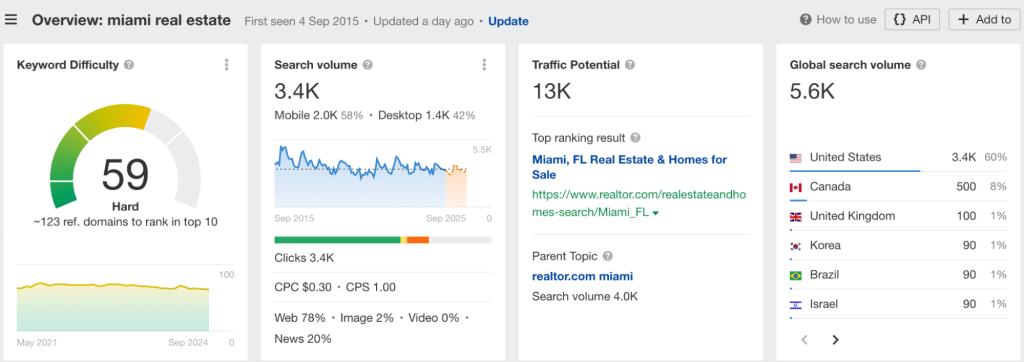
Source: Ahrefs
3. Explore keyword ideas: Ahrefs will suggest related keywords, questions, and long-tail keywords that can spark even more content ideas for your real estate business:

Source: Ahrefs
4. Filter and refine: Narrow down your list by focusing on relevant keywords that perfectly balance search volume and difficulty. You might uncover some hidden gems with less competition but still plenty of potential traffic.
If you can’t find anything suitable, try to narrow down your search. For example, high-value keywords like “Miami Beach real estate” are quite broad and competitive. If you work out of South Beach, you could search for “South Beach real estate.” This keyword has a keyword difficulty of 12, a search volume of 250, and a potential of 3,700 searches a month. For local real estate businesses, this is a good amount of traffic.
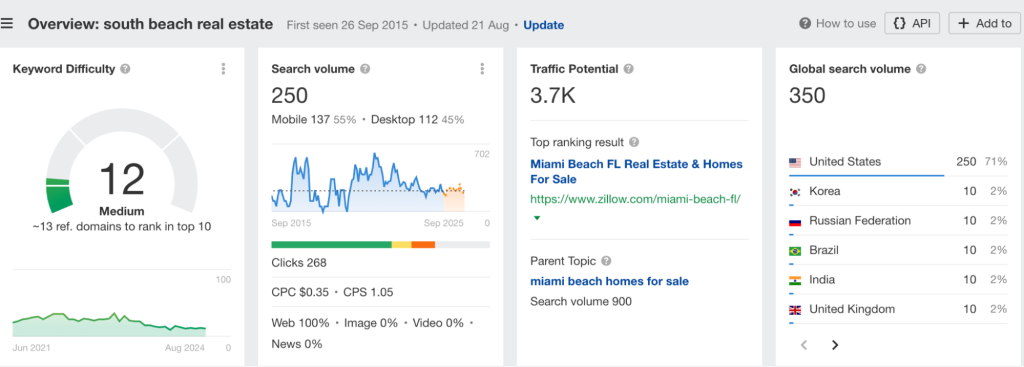
Source: Ahrefs
| 💡Pro-tip: Think local
Remember to include search terms specific to your location. For example, “Miami real estate agent” or “condos for sale in South Beach” can help you attract the right audience. |
1. Check the SERP overview: See who’s currently ranking for your target keywords. Can you create even better and more informative content?

Source: Ahrefs
2. Download and organize: Once you’ve got your winning keywords, export them to a spreadsheet. Under “keyword ideas,” click on “view all.” This will take you to a detailed page with all related keywords. On the left-hand side, click “Export,” and choose to download the data in CSV format:
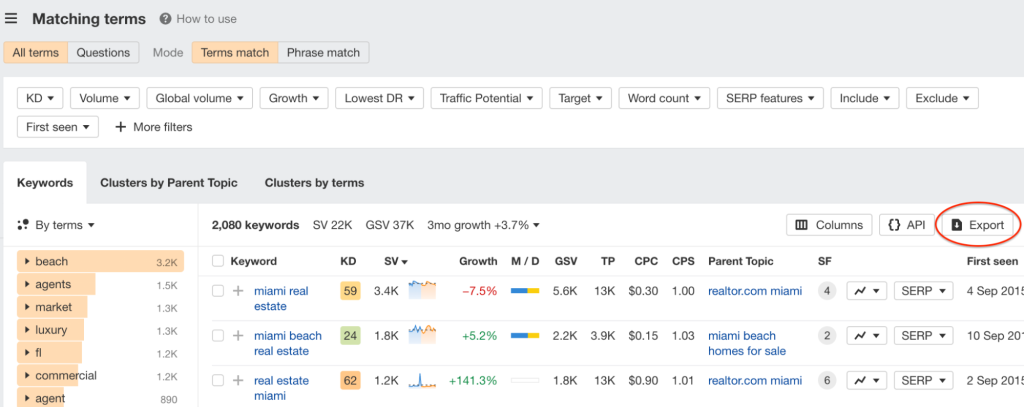
Source: Ahrefs
| 💡Pro-tip: Don’t have access to an SEO tool?
Don’t worry! To look for target keywords, you can use Google’s Keyword Planner. It’s a free tool that can help you with keyword research. |
1. Create a content calendar: Map out your content strategy like a pro! Decide which topics you’ll tackle and when you’ll publish them. A well-organized calendar keeps you on track and ensures a consistent flow of fresh content.
2. Finally, write the content. Now comes the fun part: creating content that’s so good that people can’t help but share it. If writing isn’t your forte, enlist the help of professional writers and designers on Fiverr or Upwork. A polished, well-presented article goes a long way.
Optimize for technical SEO
Now that you know how to do keyword research and create valuable content, the next step in your SEO strategy is to consider technical SEO.
Technical SEO is all about ensuring that your online presence’s engine is running smoothly and efficiently so Google can easily access, understand, and showcase your content to the world.
Here’s a look at some key technical SEO elements:
Accessibility and indexing
This involves ensuring that search engines can crawl (read) and index (store) your site’s content without encountering any obstacles. It includes addressing issues such as:
➡️Robots.txt: Think of this as a set of instructions you give to search engine bots. It tells them which parts of your website they’re allowed to visit and which parts are off-limits. This helps you control how your site is crawled and indexed.
➡️No-index tags: These are little snippets of code you can add to specific pages on your website to tell search engines not to include them in their index. This is useful for pages you don’t want to show up in search results, like private client portals or thank-you pages.
➡️Canonical tags are essential when you have similar or duplicate pages. A canonical tag points search engines to the “main” version of a page, helping to consolidate SEO signals and avoid duplicate content issues, which can confuse search engines and hurt your rankings.
➡️XML sitemaps: This is like a roadmap of your website that you hand to Google. It lists all the essential pages on your site, making it easier for search engines to find and index your content quickly and efficiently. Here is a guide on how to submit an XML sitemap.
Lastly, regularly checking for indexing problems with tools like Google Search Console is also important.
Crawling
Think of Google’s bots as visitors exploring your website. A well-configured crawl allows these bots to navigate your site efficiently without encountering errors like endless loops or broken links.
ℹ️ Tools like Screaming Frog can help you monitor and address any crawling issues.
Site speed
A fast-loading website is crucial for both user experience and SEO. Optimize image sizes, minify scripts, and address any JavaScript issues that may slow down page loading times on your real estate website.
You can use Google PageSpeed Insights to test the speed of your web pages. Ideally, your web pages should load in under 3 seconds.
Structured data
Implementing schema markup (structured data) on your pages helps search engines better comprehend your content, increasing your chances of appearing in rich snippets—these are enhanced search results with additional information like star ratings or business hours.
Below is an example of how structured data appears in search engine results:

ℹ️ Here is a guide on how to implement structured data.
Security
Website security is important for protecting users and is also directly tied to your site’s performance and ranking in search engines.
Google has made security a ranking factor. Websites that use HTTPS encryption to secure the data exchanged between users and the site are more likely to rank higher than those that don’t use it.
ℹ️ Here is a guide on how to implement HTTPS encryption on your website.
Site architecture
Organize your website’s content logically by creating clear categories and subcategories. This makes it easier for users and search engines to find information.
Optimize off-page SEO
Off-page SEO is all about building your reputation beyond your real estate website and establishing yourself as a trusted expert in the real estate arena.
The cornerstone of off-page SEO is link building—the process of earning valuable backlinks from other websites to your own.
These backlinks act as votes of confidence, signaling to search engines that your content is relevant and authoritative. The more quality backlinks your site has, the more likely it is to rank higher in the SERPs.
| 💡Key point: Quality vs. quantity? When it comes to backlinks, the debate between quality versus quantity is important for real estate SEO. While it might be tempting to focus on getting as many links as possible, quality links from authoritative, relevant websites are far more beneficial for your SEO.An example of a quality backlink would be being featured in The Miami Herald or Curbed for your local market expertise. These links come from trusted, relevant sources and improve your real estate SEO.In contrast, a lousy backlink would come from a low-quality, irrelevant site, such as a random directory or a spammy blog unrelated to real estate. |
Let’s illustrate this with an example: Consider the local search term “real estate agent Miami.” While less competitive than broader terms, securing a top spot still requires a robust backlink profile. The top-ranking websites for this keyword have a significant number of backlinks:

Source: Ahrefs
| 👑Feeling overwhelmed?
Link building can be a complex and time-consuming process. If you’re ready to take your off-page SEO to the next level without the hassle, consider partnering with Authority Builders. Our team of experts specializes in crafting custom link-building strategies that deliver results for real estate businesses. Let us handle the heavy lifting while you focus on what you do best–closing deals! Sign up today. |
So, how can you compete and earn those coveted backlinks? Here are a few effective link-building tactics tailored specifically for real estate professionals:
Guest posting
Guest posting involves contributing articles to other websites or blogs in your industry. In exchange for your valuable content, you usually get a backlink to your site, which boosts your SEO.
Reach out to reputable websites in the real estate or related industries, offering to write valuable, informative content. Make sure the content you provide aligns with the interests of their audience. In exchange, request a link to your website within the article or author bio.
Unlinked mentions
Sometimes, your real estate brand, business, or name is mentioned online but doesn’t link back to your website. These are known as “unlinked mentions,” and they present an opportunity for gaining backlinks.
Use tools like Google Alerts to monitor mentions of your brand across the web. When you find an unlinked mention, contact the website owner and politely ask them to link the mention to your website.
Here’s how to look for unlinked mentions in Google Alerts:
- Go to Google Alerts.
- In the search box, enter the keywords or phrases you want to track. Focus on variations of your business name, key agents’ names, or specific properties or developments you’re marketing.
- Click on “Show options” to customize your alerts further. Here, you can customize how frequently you receive alerts, the types of content to monitor, the language, the region, and the number of results included.
- Once your alerts are set up, you’ll start receiving email notifications whenever Google finds new content matching your search terms.
- If the mention is on a relevant and high-quality website, consider contacting the website owner or author. Politely thank them for the mention and ask whether they would be willing to add a link to your website.
Linkable assets
Want to attract backlinks? Create valuable resources that other websites can’t resist linking to. Think tools, calculators, or in-depth guides that solve your audience’s pain points and offer genuine utility.
Here’s how to make it happen:
- Go the extra mile and develop beneficial content, like interactive mortgage calculators, neighborhood-specific market reports, or comprehensive home-buying/selling guides.
- Once you’ve created the asset, don’t hesitate to promote it on your social media channels.
ℹ️ Example: Austin Real Estate Partners’ website has a handy mortgage calculator. It’s a perfect example of a linkable asset. Other sites providing mortgage information or financial advice will likely link back to this tool, driving traffic and boosting their real estate SEO—and yours.
PR backlinks
Another way to improve the visibility of your real estate website is to obtain PR backlinks. You can get backlinks from news outlets or media sites by making announcements or issuing press releases about major business updates.
Not every announcement deserves a press release. Focus on major updates that are truly relevant and interesting to your audience and the media.
Consider acquisitions, new developments, groundbreaking market insights, or charitable initiatives showcasing your community involvement.
We recommend that you partner with a digital PR agency to help you craft and distribute compelling press releases to a wide network of journalists and media outlets. This will increase your chances of being picked up by major publications and earning those coveted backlinks.
ℹ️ Example: When William Raveis Real Estate announced a strategic acquisition, it wasn’t just a business move but a PR opportunity. This newsworthy update attracted media attention, earning it backlinks from high-authority sites like Crunchbase and Housingwire.
Publish local market stats
By publishing local real estate market trends, you’re not just sharing valuable information but also positioning yourself as the go-to expert in your area.
This strategy is a win-win: you’ll be attracting potential clients who value your insights and earning valuable backlinks from other websites eager to reference your data.
Here’s how
- Dive into the latest statistics and trends in your local market. Compile data on median home prices, days on the market, inventory levels, and any other insights buyers and sellers crave.
- Turn that data into easy-to-understand reports with eye-catching visuals. Use charts, graphs, and infographics to bring those numbers to life.
- Spread the word: Once your reports are ready, share them widely! Post them on your website, promote them through email newsletters and social media, and even reach out to local news outlets or industry blogs.
ℹ️ Example: Here is an example report on Spokane property trends by Phil Wells Real Estate.
Infographic link building
They say a picture is worth a thousand words, which couldn’t be more true in real estate SEO. Infographics—visual representations of data and ideas—are like magnets for backlinks.
They simplify complex information, making it easy to digest and share, which is exactly what other websites love to feature.
Here is how to do it:
- Consider the questions your audience asks or the data that might surprise them. Are there: Market trends that can be visualized? Cost comparisons that highlight your value proposition? Or a step-by-step guide to the home-buying process?
- Invest in professional design to create an infographic that’s not only informative, but also visually stunning. Use vibrant colors, clear fonts, and engaging illustrations to tell your story.
- Once your infographic is ready, share it far and wide.
ℹ️ Example: CA Flat Fee doesn’t just tell you they’re a cost-effective option; they show you. Their infographic comparing traditional real estate fees to their flat-fee model is a brilliant example of link-worthy content. It’s visually appealing, easy to understand, and provides valuable information that other websites will likely reference and link back to.
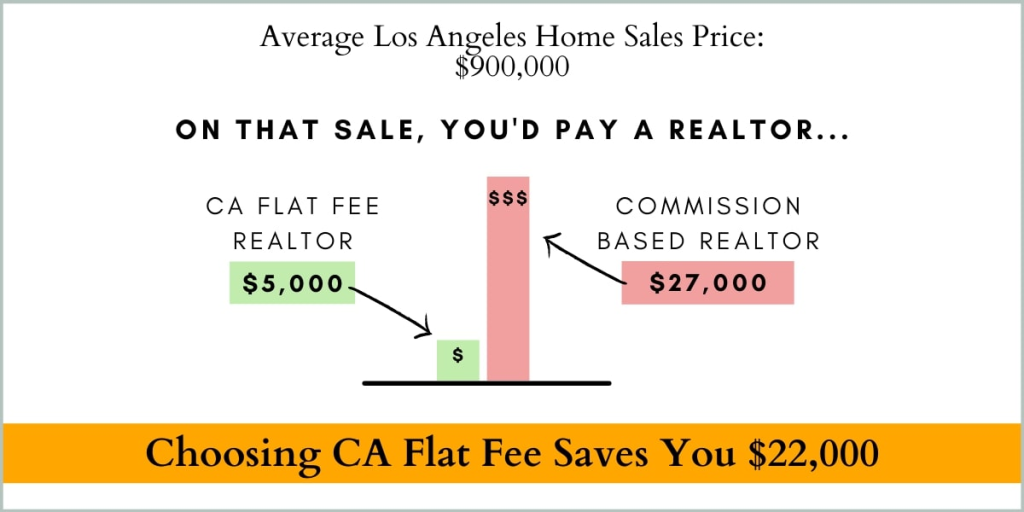
Source: CA Flat Fee
Track your results
Tracking your results is crucial for proving the ROI of your efforts and making data-driven decisions to optimize your real estate SEO strategy.
Assessing performance is about understanding what’s working, what’s not, and where to focus your energy for maximum impact.
Which tools should you have in your SEO toolbox?
- Web platform analytics (like Google Analytics): These are your go-to options for tracking website traffic, user behavior, and conversions, showing how visitors interact with your content.
- Google Search Console (GSC): This gives you direct insights into how Google sees your website. You’ll see which keywords drive traffic, how your pages rank, and any potential issues that need to be addressed.
- Ahrefs: As shown above, this SEO tool provides a wealth of data on backlinks, keyword rankings, and competitor analysis.
Here are a few metrics to keep track of:
📈Organic traffic: How many visitors find your website through search engines?
📈Keyword rankings: Are you making steady progress in climbing those search engine result pages for your target keywords?
📈Backlinks: How many high-quality links are pointing to your site?
📈Conversions: Are visitors taking action on your website, like filling out a contact form or scheduling a showing?
Final Thoughts
This comprehensive guide has equipped you with an effective real estate SEO strategy that contains all the knowledge and tools needed to transform your real estate website into a lead-generating powerhouse.
Remember, SEO is a continuous process that requires dedication, but the payoff in terms of increased visibility, qualified leads, and brand authority is undeniable.
Ready to take your real estate SEO to the next level?
Partner with Authority Builders and let our team of experts handle the heavy lifting. We’ll help you achieve top rankings and dominate your local market by securing high-quality backlinks. Contact us today for a free consultation and discover how we can elevate your online presence!
